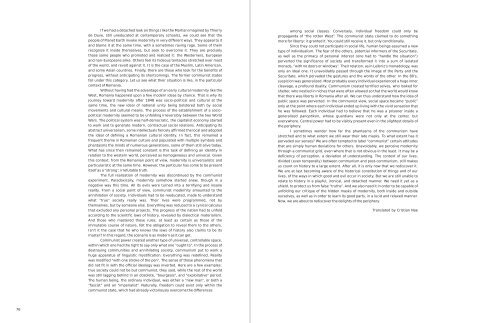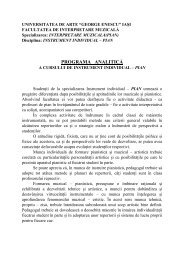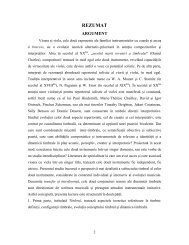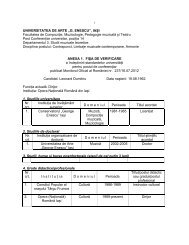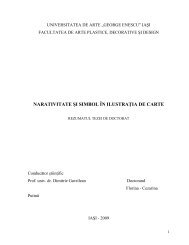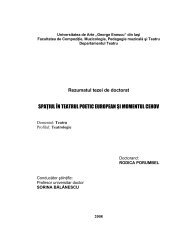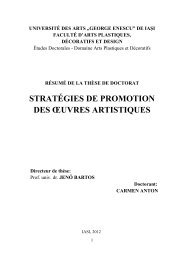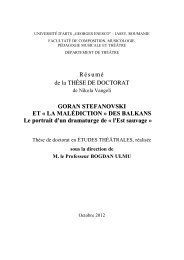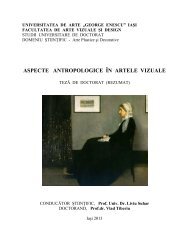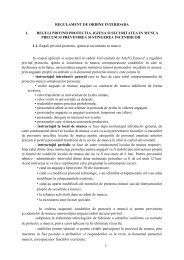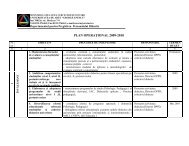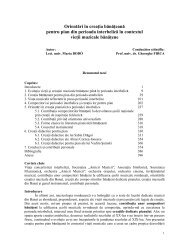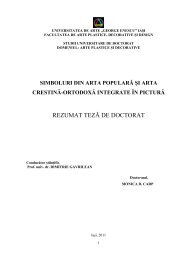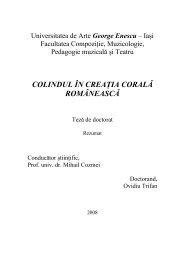vector 2_1.cdr - Universitatea de Arte "George Enescu"
vector 2_1.cdr - Universitatea de Arte "George Enescu"
vector 2_1.cdr - Universitatea de Arte "George Enescu"
You also want an ePaper? Increase the reach of your titles
YUMPU automatically turns print PDFs into web optimized ePapers that Google loves.
76<br />
If we had a <strong>de</strong>tached look on things (like the Martian imagined by Thierry<br />
<strong>de</strong> Duve, still uneducated at contemporary schools), we could see that the<br />
people of Planet Earth invoke mo<strong>de</strong>rnity in very different ways. They appeal to it<br />
and blame it at the same time, with a sometimes raving rage. Some of them<br />
recognize it insi<strong>de</strong> themselves, but seek to overcome it. They are precisely<br />
those same people who promoted and realized it: the Westerners, European<br />
and non-Europeans alike. Others feel its hi<strong>de</strong>ous tentacles stretched over most<br />
of the world, and revolt against it. It is the case of the Muslim, Latin American,<br />
and some Asian countries. Finally, there are those who look for the benefits of<br />
progress, without anticipating its shortcomings. The former communist states<br />
fall un<strong>de</strong>r this category. Let us see what their situation is like, in the particular<br />
context of Romania.<br />
Without having had the advantage of an early cultural mo<strong>de</strong>rnity like the<br />
West, Romania happened upon a few mo<strong>de</strong>rn i<strong>de</strong>as by chance. That is why its<br />
journey toward mo<strong>de</strong>rnity after 1848 was socio-political and cultural at the<br />
same time, the new i<strong>de</strong>al of national unity being bolstered both by social<br />
movements and cultural means. The process of the establishment of a sociopolitical<br />
mo<strong>de</strong>rnity seemed to be unfolding irreversibly between the two World<br />
Wars. The political system was half-<strong>de</strong>mocratic, the capitalist economy started<br />
to work and to generate mo<strong>de</strong>rn, contractual social relations. Anticipating its<br />
abstract universalism, some intellectuals fiercely affirmed the local and adopted<br />
the i<strong>de</strong>al of <strong>de</strong>fining a Romanian cultural i<strong>de</strong>ntity. In fact, this remained a<br />
frequent theme in Romanian culture and populated with multiple symbols and<br />
phantasms the minds of numerous generations, some of them still alive today.<br />
What has since then remained constant is this task of <strong>de</strong>fining an i<strong>de</strong>ntity in<br />
relation to the western world, perceived as homogeneous and univocal. Given<br />
this context, from the Romanian point of view, mo<strong>de</strong>rnity is universalistic and<br />
particularistic at the same time. However, the particular has come to be present<br />
itself as a “strong”, irrefutable truth.<br />
The full realization of mo<strong>de</strong>rnity was discontinued by the communist<br />
experiment. Paradoxically, mo<strong>de</strong>rnity somehow started anew, though in a<br />
negative way this time. All its evils were turned into a terrifying and insane<br />
reality. From a social point of view, communist mo<strong>de</strong>rnity amounted to the<br />
annihilation of society. Individuals had to be reeducated, ma<strong>de</strong> to un<strong>de</strong>rstand<br />
what “true” society really was. Their lives were programmed, not by<br />
themselves, but by someone else. Everything was reduced to a cynical calculus<br />
that exclu<strong>de</strong>d any personal projects. The progress of the nation had to unfold<br />
according to the scientific laws of history, revealed by dialectical materialism.<br />
And those who mastered these rules, at least as certain as those of the<br />
immutable course of nature, felt the obligation to reveal them to the others.<br />
Isn't it the case that he who knows the laws of history also claims to be its<br />
master? In this regard, the scenario is as mo<strong>de</strong>rn as it can get.<br />
Communist power created another type of universal, controllable space,<br />
within which one had the right to say only what one “ought to”. In the process of<br />
<strong>de</strong>stroying communities and annihilating society, communism put to work a<br />
huge apparatus of linguistic mystification. Everything was re<strong>de</strong>fined. Reality<br />
was modified “with one stroke of the pen”. The sense of those phenomena that<br />
did not fit in with the official i<strong>de</strong>ology was inverted. Here are a few examples:<br />
true society could not be but communist, they said, while the rest of the world<br />
was still lagging behind in an obsolete, “bourgeois”, and “exploitative” period.<br />
The human being, the ordinary individual, was either a “new man”, or both a<br />
“fascist” and an “imperialist”. Naturally, freedom could exist only within the<br />
communist state, which had already victoriously overcome the differences<br />
among social classes. Conversely, individual freedom could only be<br />
propaganda of “the rotten West”. The communist state claimed to do something<br />
more for liberty: it granted it. You could still receive it, but only conditionally.<br />
Since they could not participate in social life, human beings assumed a new<br />
type of individualism. The fear of the others, potential informers of the Securitate,<br />
as well as the primacy of personal interest (one had to “handle the situation”)<br />
perverted the significance of society and transformed it into a sum of isolated<br />
monads, “with no doors or windows”. Their relation, as in Leibniz's monadology, was<br />
only an i<strong>de</strong>al one. It unavoidably passed through the image of the Party and the<br />
Securitate, which perva<strong>de</strong>d the gestures and the words of the other. In the 80's,<br />
suspicion was generalized. Most probably every individual experienced a huge inner<br />
cleavage, a profound duality. Communism created terrified selves, who looked for<br />
shelter, who nestled in niches that were often allowed so that the world would know<br />
that there was liberty in Romania after all. We can thus un<strong>de</strong>rstand how the i<strong>de</strong>a of<br />
public space was perverted. In the communist view, social space became “public”<br />
only at the point where each individual en<strong>de</strong>d up living with the vivid sensation that<br />
he was followed. Each individual had to believe that he was a prisoner insi<strong>de</strong> a<br />
generalized panoptikon, whose guardians were not only at the center, but<br />
everywhere. Central power had to be visibly present even in the slightest <strong>de</strong>tails of<br />
the periphery.<br />
I sometimes won<strong>de</strong>r how far the phantasms of the communism have<br />
stretched and to what extent we still wear their late masks. To what extent has it<br />
perva<strong>de</strong>d our senses? We are often tempted to label “communist” certain attitu<strong>de</strong>s<br />
that are simply human <strong>de</strong>viations for others. Unavoidably, we perceive mo<strong>de</strong>rnity<br />
through a communist grid, even where that is not obvious in the least. It may be a<br />
<strong>de</strong>ficiency of perception, a <strong>de</strong>viation of un<strong>de</strong>rstanding. The context of our lives,<br />
divi<strong>de</strong>d (even temporally) between communism and post-communism, still makes<br />
us count on history to a large extent. After all, it is only now that we rediscover it.<br />
We are at last becoming aware of the historical constitution of things and of our<br />
lives, of the ways in which good and evil occur in society. But we are still unable to<br />
relate to history in a playful, ironical, and <strong>de</strong>tached manner. We need it yet as a<br />
shield, to protect us from false “truths”. And we also need it in or<strong>de</strong>r to be capable of<br />
unfolding our critique of the hid<strong>de</strong>n masks of mo<strong>de</strong>rnity, both insi<strong>de</strong> and outsi<strong>de</strong><br />
ourselves, as well as in or<strong>de</strong>r to learn its good parts, in a lucid and relaxed manner.<br />
Now, we are about to rediscover the <strong>de</strong>lights of the periphery.<br />
Translated by Cristian Nae


